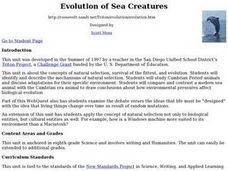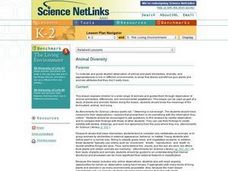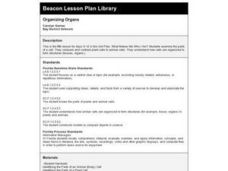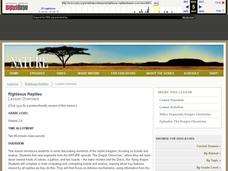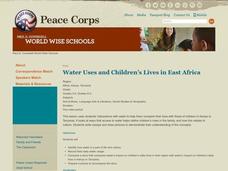Curated OER
Diversity And Adaptations Of Organisms
Seventh graders demonstrate the processes of science by posing questions and investigating phenomena through language, methods and instruments of science. They study the body features or systems of several animals.
Curated OER
Forest Food Web Activity
Learners gain knowledge of food webs and ecological interconnections in the forest, and place different life forms in their proper place in a food chain. Students appreciate the balance of nature and how humans are affected by extinct...
Curated OER
Visualizing Trees
students draw what they visualize after the teacher reads a page from the book Oak Trees. They share their pictures and compare how they visualized the tree being described.
Curated OER
Surrealism
Seventh graders research several surrealist artists, e.g. Dali, Magritte, etc., and analyze and compare their styles. They apply their knowledge to their own drawings in pastel of flowers and plants.
Curated OER
I Imagine....
In this writing prompt worksheet, students choose fantasy or real animals to describe in a poem or story. Students draw pictures of their animals as well.
Curated OER
Basic Knowledge of Big Cats
First graders create a KWL chart on big cats. For this animal science lesson, 1st graders brainstorm what they already know about big cats and research big cats using various suggested websites. Students fill in the last column of the...
Curated OER
The Edge of Home
Students explain why some species of plants and animals occur in more than one area. They watch as the teacher puts an overlapping circles on the chalkboard, students are asked to predict what kinds of things they would expect to find in...
Curated OER
Now Hear This!
Students observe the differences between low- and high-frequency sounds. They research and compare the characteristics of various animals that rely on infrasonic sounds to communicate.
Curated OER
Evolution of Sea Creatures
Young scholars identify and describe the mechanisms of natural selection. They study Cambrian Period animals and discuss adaptations for their specific environment.Students compare and contrast a modern sea animal with the Cambrian era...
Curated OER
Texture: Wild Things
Students experiment with different kinds of marking techniques. They read "Where the Wild Things Are" and observe animals for pattern and line. They compare illustrations with Haring's images. They create a symbolic drawing of animal.
Curated OER
Reconstructing the Squares
Learners visit an outdoors area and mark out a square on the ground that they examine, looking for living and non-living things. They make a model or drawing of the findings from the actual square.
Curated OER
Animal Diversity
Students examine plants and animals for their similarties and differences. They are read stories and note how the animals in the stories do not have the qualities that real animals have. They complete a worksheet to end the lesson.
Curated OER
Cave Paintings
Students examine various types of prehistoric art. In groups, they research the purpose of the drawings and use the internet to research the various ancient human groups. To end the lesson plan, they draw animals compared to the...
Curated OER
Animal Diversity
Pupils use the Animal Diversity E-Sheet to access the Where Can Animals Live? online book.
Curated OER
Organizing Organs
Fifth graders research plant and animals cells and create a Venn Diagram to show the similarities and differences.
Curated OER
Respect the Beach
Students work together to compare and contrast sand particles. They identify what sand grains are composed of as well. They complete writing activities to complete the lesson.
PBS
Righteous Reptiles
Young scientists write and draw about their knowledge of reptiles. They also view a nature video focusing on lizards and snakes, complete a chart comparing and contrasting them. Next, they focus on the defense mechanisms...
Curated OER
Critter Encounter Chart
Young scholars record data found at an assigned web site. In this data collection lesson, students access an assigned web site in order to complete a data chart about animals they see. They travel to different sections of the web site to...
Curated OER
Water Uses and Children's Lives in East Africa
Students identify how water use is part of life and culture. Students record their daily water usage and compare results with classmates. Students complete the graphic organizer on water and children. Students compose an essay, which...
Curated OER
Summarize This!
Students explore how to summarize a reading passage. They read non-fiction books. Students use a Venn Diagram to compare and contrast the two animals they read about. They write a summary using the information in their Venn Diagram.
Curated OER
Frogs Frogs Frogs
Young scholars view a disk on the continental movement and analyze the given data on fossils, rock types and climate zones. In this geology lesson plan students draw a diagram of the earths layers, take a quiz complete a PowerPoint...
Curated OER
Seahawk Educational & Environmental Discovery Program
Pupils identify and describe local poisonous plant/animals. They compare characteristics of three local ecosystems and describe common plants from different ecosystems; comparing shapes, colors, textures, and measuring sizes.
Curated OER
Narrative Cartoons
Students compare and contrast the traditional superhero cartoon with a narrative cartoon. Students research water resources and usage in Africa and create original narrative cartoons showcasing their findings.
Curated OER
Investigating Crickets and Their Body Parts
Second graders investigate the body of a cricket. In this biology lesson plan students use tools to gain information about the insect the cricket. Students observe and identify features and describe how these features help the cricket...








